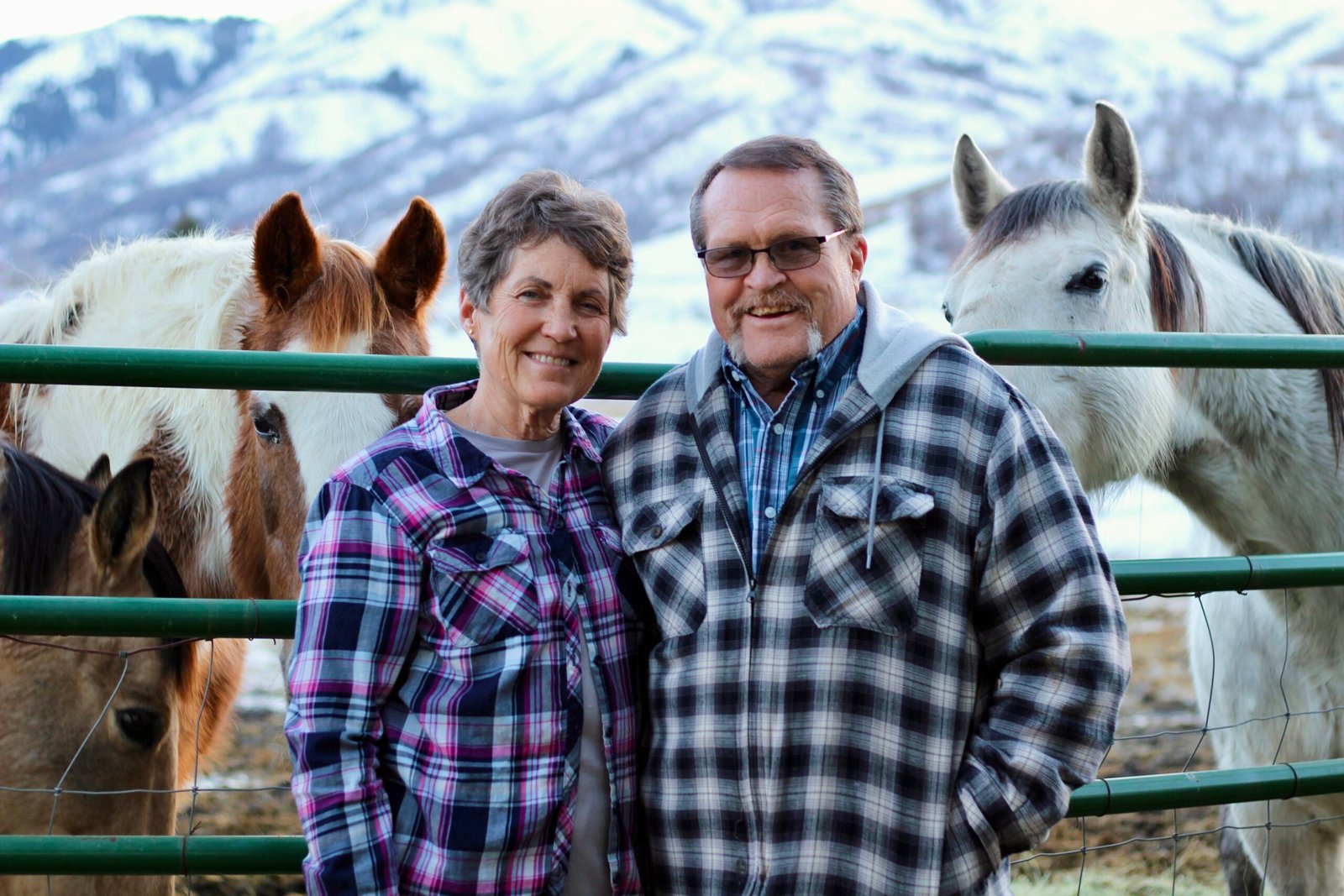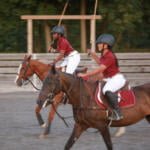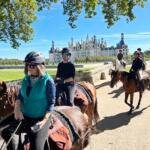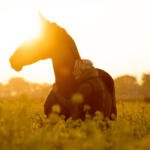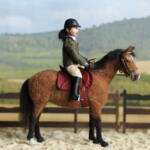RaDonna and Steve Lowder have been trail riding through the rocky mountains for over three decades. They keep seven horses at their home in a picturesque little valley in Northern Utah, along with their goats, chickens, and cats.
BRU spoke with Steve and RaDonna about their horse ownership journey, some of their scrapes and spills, what they enjoy most about trail riding, and how horses fit into their family.
This interview has been edited for length and clarity.
BRU: How did you start riding?
RL: Steve had some family with horses that he rode some growing up. I didn’t grow up with horses, but I went riding a few times in high school. It was scary the first time, but I did okay.
One time I wore shorts. You never wear shorts, but I didn’t know that. I got a bee caught between my leg and the saddle, and it stung me. I screamed, and the horse bolted. I got him stopped, and after that, I figured, “Well, the worst is over.” I’d survived, so I wasn’t scared anymore!
When we got married, we started archery hunting together. One time, I got a cow elk. We skinned it and hauled some of the meat out on our backs, but we didn’t reach camp until one o’clock in the morning. To get the rest of the meat out, we borrowed a sheepherder’s horse, and Steve said, “We gotta get us some of those.” So that’s how it started.
We bought two horses. Our new mare ended up being pregnant, so she had a colt. That warmed my heart. I loved raising that baby so much that we bred mares a few times. Many of the seven we have now are from the same father. Four years ago, Steve said, “That’s enough—no more.” (laughs)
BRU: Tell me a little bit about your horses.
RL: Our first one, Rad, was a quarter horse, and Steve rode him, but he was like riding a fifty-gallon drum, and it made Steve’s hips hurt.
Magnolia is my favorite. She’s twenty-six this year, and she’s half mustang and half American saddlebred. The other horses defer to her. She’s a lot narrower and a faster walker. They all have American saddlebred in them, except for our first one.
SL: Cherokee was my favorite. He did anything I wanted, any time. He’d always come to me, and we got along well. He led on the trail.
I really liked him, but he got colic, and we had to put him down. I cried like a baby. We’d had him nineteen years.
RL: It was hard. It’s always hard to lose one. It’s like losing one of your kids. They’re big, sweet animals. They each have a different personality, and once you have a bond with them, you can depend on them.
BRU: What resources did you find most helpful when you got started?
SL: We learned as we went. We had a lot of friends who helped us, and we’d ask questions. Our farrier was a close friend, and he gave us pointer
RL: Our daughter did 4-H. She learned a lot about horses that way, and she competed. I was impressed with the program.
Anytime I meet someone who has horses, I love to sit and visit. If they’ve lost a horse, I just feel for them, you know? Someone who’s been through that can understand what they’re going through.
BRU: Is it important to rely on your horses on the trail?
RL: One time, we were coming out of the backcountry, and I came off and landed badly. When I got back on, my horse knew I was hurt, and he was so careful. He knew I needed help.
SL: Another time, we rode home in the dark. That’s hard, when you can’t see where you’re going. You have to depend on that horse. There were trees on both sides and big water puddles on the trail. You couldn’t see the water, so you had to hang on and be ready for your horse to pick the best route. It’s important to depend on them and trust them.
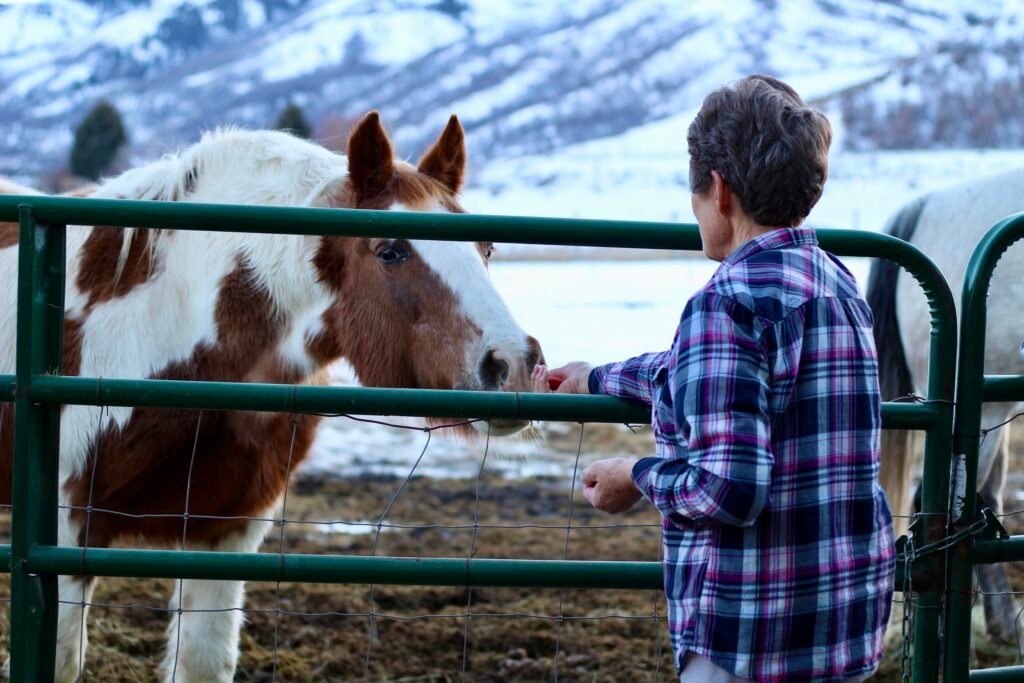
BRU: Do you have any funny trail-riding memories?
RL: I remember once in the winter, I was on our second mare, Rainy. As she came down a hill, she started running, and I went, “Oh, yay!” because it was fun, but it scared her, and she threw me right in the snow!
SL: Once we stopped at a pond to let the horses get a drink. I rode out in the water a little ways, and my horse started pawing. Back then, we had no idea what he was doing (laughs).
So, he laid down, I fell off, and he rolled. I got soaked. From then on, we watched out for pawing.
BRU: Have you had any injuries?
SL: Horses can be dangerous if you don’t pay attention. Once, RaDonna was on Magnolia, and there was a little creek right before a slope, and Magnolia didn’t want to cross it.
RL: I got off to coax her, and she started forward, so I turned around to climb the slope. But, Magnolia jumped and landed on me. I broke a couple of ribs and punctured a lung. Another time, I broke my pelvis after my horse crow-hopped, and I came down on the saddle horn.
SL: Things can happen, and we’ve had a few injuries, but when you know their habits and pay attention, they’re just gentle giants. They’re big, they’re heavy, but they get used to you, and they know you. They learn all about you.
RL: A good ride is when you don’t get hurt—the horse or you—that’s the best ride.
BRU: What are some of your favorite memories?
SL: One time we went riding in a full moon on a really cold night in a field nearby, and we went running through the deep snow. We have dry powder snow out here, so the flakes just flew up in a cloud, and it was sparkling in the air all around us.
Another time, we went riding in the mountains in the spring, and we found a whole valley, probably 100 acres or more, all colored with the new wildflowers coming up—purple and red and violet. It was just gorgeous.
RL: Spring is my favorite time to go riding. One year we saw two sandhill cranes on the top of the mountain, and we saw their babies, with their cute little red heads and only six inches tall. They were scurrying around through the sagebrush. We never would have seen that if we hadn’t been on horses.
That’s one thing I love about horses—you can go anywhere, just about, and the scenery is so pretty. I don’t know how many sunrises and sunsets I’ve seen on horseback.
BRU: Do you have any advice for others who are starting out?
RL: Plan ahead and prepare. Talk to people who ride because they’ll have suggestions. Use your resources and your horse community.
SL: Brush them down often and love them. Never let your horse run home. If you do, they get used to it, and if you fall off on a ride, they’ll take off without you. But if you never let them, they’ll stand there and wait for you to get back on, and it’s not a big deal for them.
RL: Teach your horses good manners, and be persistent. For a while, we had trouble catching one mare, and I’d walk around after her for forty-five minutes. She finally learned I wasn’t going to give up, and she just stood there and let me catch her after that.
You have to know your horse and learn their habits, likes, and dislikes. Try to keep things positive. Be safe, but don’t be afraid to try new things. Build trust with your horses.
Every horse person has unique stories and perspectives. Please consider sharing yours.
Photo by Barn Rats United.

